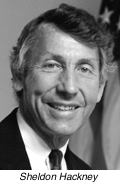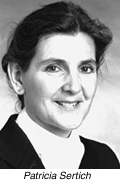
Lindback and Provost's Awards:
Sketches of the 2001 Winners
Non-Health Schools:
ALLEN | BROWNLEE
| HACKNEY | McMAHON
Health Schools: BRASS
| SERTICH | SPATZ
Provost's Awards: BORDEAUX | WEBER
In the Non-Health Schools
 |
H. Franklin Allen, Nippon Life Professor of Finance, and professor of economics, came to Penn in 1980 after earning a D.Phil. from Oxford. He has twice won the Anvil Award, and the Class of 1984 Award for the person with the highest teaching evaluations in the MBA Program, and he has won the MBA Excellence in Teaching Award seven times. A former Lindback winner writes: "If I had to choose one professor at Wharton to win a Lindback Award, Franklin Allen would unquestionably be my choice." Another writes: "I have known Franklin both as his student and his colleague. I do not know another person at Penn who is more qualified for this award." Students spoke of his dedication, his skill in fostering a learning environment at Wharton and at the University, and his quick responses to e-mail even on Sunday evenings. A student notes: "When I graduate from the Wharton School, I will no doubt reflect upon my interactions with Professor Allen as the highlight of my experience at the University." Another writes: "When I was visiting grad students at NYU and mentioned that I was a teaching assistant for Franklin Allen, they asked 'you mean the Franklin Allen!'" He is an intellectual leader in his field, widely published and often cited and he is able to convey this knowledge to students in an extraordinary way. |
 |
Sheldon Hackney, professor of history, received his Ph.D. from Yale and came to Penn as professor of History and President in 1981. During his tenure as President, he taught a History seminar each year and there was always a waiting list to get into the course. Students in the course were unanimous in their praise for Dr. Hackney and for how much they had learned in his seminar. He is now working in the new pilot curriculum as a member of the Committee on Undergraduate Education in the College. Students praise his respect for their ideas and his ability to foster their creativity and independent thought and his skill in fostering open discussions in and out of class. A student writes: "I can honestly say that through my work with Dr. Hackney, I left Penn a better writer, student of history, and creative thinker," while another notes: "I frequently advise current Penn students that, whether or not they are History majors, they must take one of Dr. Hackney's classes before they graduate." Both students and colleagues noted his love for American history, his respect for his students and his challenging approach to historical questions. By his deep commitment to knowledge and to his students, he embodies the ideals of the Lindback Award. |
 |
Charles McMahon, professor of materials science and engineering, joined the Engineering faculty in 1964 after receiving degrees from Penn and MIT. He has received the S. Reid Warren, Jr. Award for Distinguished Teaching from SEAS. Students commented on how creative Dr. McMahon is in the classroom and colleagues noted his inventive teaching methods through the use of electronic media. He pioneered in the use of videotape and CD/web based teaching. His innovative course on the Bicycle and Walkman is widely recognized and is described as the most challenging introductory materials science course in the country. He received a grant from the NSF to create a series of CDs to be used in teaching. Students review the CD before class so that classroom time can be devoted to coaching, tutoring and discussion. He has co-authored the widely regarded textbook used in class and although he has been teaching for over 30 years he is still actively working on development of new course materials. Students mentioned his unique role as an advisor and mentor and many wrote about the impact his classes have had on their lives and careers. Dr. McMahon is a distinguished scientist and a member of the National Academy of Engineering and an extraordinary teacher whose contributions are worthy of recognition. |
Non-Health Schools:
ALLEN | BROWNLEE
| HACKNEY | McMAHON
Health Schools: BRASS
| SERTICH | SPATZ
Provost's Awards: BORDEAUX | WEBER
In the Health Schools
 |
Lawrence (Skip) Brass, professor of medicine, pathology and laboratory medicine and professor of pharmacology, received an A.B. degree from Harvard and a M.D. from Case Western University. He joined the Penn Med faculty in 1979. He is a three-time recipient of the Excellence in Teaching Award at the Medical School. Dr. Brass has served as Director of the Combined Degree Program, which has become the largest in the country. His ability to teach at an especially sophisticated level in part derives from his extraordinary talents as both a basic scientist and a clinician. One student notes: "Dr. Brass' lecture notes are the quality of a textbook and his ability to use technology to teach is unparalleled," while another comments: "He even makes 8 a.m. classes an inspiration rather than a chore." In his role as Director, Dr. Brass created the M.D./Ph.D. grand rounds to allow students to fuse their knowledge in the clinical and basic sciences. Topics are discussed from both the clinical and the basic science perspective. A colleague notes: "In Skip, the combined degree students have an extremely effective and selfless advocate on their behalf with the School of Medicine." He has involved himself with every aspect of education from effective lecturing, to course direct, to direction of training grants, and finally, the day to day administration of the entire combined Degree Program. |
 |
Malcolm Cox, professor of medicine and associate dean of medicine academic programs, and Director of Network and Primary Care Education, came to Penn as a resident in internal medicine in 1970 after graduating from Harvard Medical School. While at Penn he has received numerous teaching prizes including the The Class of 1992 Excellence in Teaching Award, the Donald B. Martin Teaching Service Award, the Donna K. McCurdy Award for Outstanding Teaching and the Class of 2001 Distinguished Teacher Award. Letters from students repeatedly spoke of the quality of both his teaching and his interactions with students in superlative terms, "He uses the Socratic method to perfection, the highest compliment that can be paid to a teacher is that he positively affected the lives of his students. Many of us in academic medicine count Malcolm as our mentor and would not be in our present positions without his guidance. We still try to emulate him." Students frequently refer to him as inspiring while others describe him as the quintessential educator. One student writes: "His teaching abilities, empowering support, and educational vision have left a lasting impression on numerous medical students. I am hard pressed to think of anyone as deserving of the Lindback Award as Dr. Cox." Colleagues also described Dr. Cox as outstanding, noting that his dedication to teaching is unparalleled. |
 |
Patricia Sertich, associate professor of animal reproduction in clinical studies, received her V.M.D. from Penn in 1983 and joined the Veterinary School faculty in 1992. She has won the Student Government Teaching Award in 1998 and twice received the Carl J. Norden Distinguished Teaching award. Her teaching evaluations are consistently outstanding with over ninety percent of the students rating her as excellent. The comments ranged from "Dr. Sertich is everyone's favorite teacher" to "the best professor I have had at the Vet School" to a "god." Students commented frequently on her sense of humor and actually having fun in the classroom. She achieves an instant rapport with students. In addition, a number of letters from former students attest to the lasting impact Dr. Sertich has had on those in her classes: "I found myself quoting from her lectures just a couple of days ago" one former student writes, while another comments: "The lessons and the feeling of having been exposed to a great teacher have not faded; I have relied quite heavily on her lecture notes since graduation." "I attribute my choice of career specialty and my clinical skills to Dr. Sertich." Dr. Sertich loves to teach and certainly deserves recognition for her service to students. The Lindback affords that recognition. |
 |
Diane Spatz, assistant professor of health care of women and childbearing nursing, joined the Nursing faculty in 1995 as a Clinician Educator. She received her BS, MS, and Ph.D. from Penn's School of Nursing. She serves as a Faculty Fellow in Stouffer College House and is the Faculty Advisor to the Phi Sigma Sigma sorority. Dr. Spatz won the Helen Berkowitz Faculty Teaching Award in 1997 and 1998 and has achieved national recognition as an outstanding teacher and lecturer by the Sigma Theta Tau International Nursing Honor Society as well as the undergraduate advisor award from the School of Nursing. "In short, she is everything a great professor should be: intelligent, passionate about her subject, and committed to her students." "She doesn't treat her students as mere undergraduates but as future practitioners and future researchers. This sets the tone for the class and raises the bar for the students." A colleague notes: "Dr. Spatz involves her undergraduate students in the research experience, something that few faculty are willing to take the time to do. This point is made most clear by the number of students that have secured Nassau Funds for undergraduate research projects under her mentorship." She is an excellent mentor, leader, and teacher and is certainly deserving of the Lindback Award. |
Non-Health Schools:
ALLEN | BROWNLEE
| HACKNEY | McMAHON
Health Schools: BRASS
| SERTICH | SPATZ
Provost's Awards: BORDEAUX | WEBER
Provost's Awards
 |
Yvette Bordeaux, instructor in earth and environmental science, took her Ph.D. from Penn in 2000. She also serves as as the department's Associate Director for Undergraduate Programs. She volunteered to teach a non- credit course in computer skills for graduate students and has since become the one students and faculty members come to for advice on setting up programs and selecting software. One student reported that in visiting colleges as a senior in high school Yvette met with her and it was this encounter that led her to choose to come to Penn. Another student reports that Yvette's Introduction to Environmental Studies persuaded her to major in environmental studies. Other students praise her lively and thought provoking lectures, her assigned projects and her ability to make clear connections between the concepts covered in class and the real repercussions to the environment that effect lives. Some describe her ability to make her students feel like scientists. Her colleagues were equally enthusiastic in their praise: They appreciated her dedication to students and her willingness to help whenever needed. One colleague concludes: "Dr. Bordeaux represents all that is golden in the art and science of pedagogy." |
 |
Annemarie Weber, emeritus professor of biochemistry & biophysics, took her M.D. degree at University of Tubingen, Germany and joined Penn's faculty in 1972. A faculty member writes, "We owe Dr. Weber the highest honors. She stands as an example of what we should all do but rarely ever achieve: to teach with full, intelligent, informed commitment. As someone who aspires to be an outstanding teacher and mentor, I am in awe of her 'teaching style' which is both entertaining and educational--a difficult feat to pull off successfully." Students repeatedly remarked on her sense of humor, her lively lectures and consistently described her as a truly exceptional teacher. "She is extraordinarily successful at clarifying difficult concepts, integrating clinical correlations, and providing a big picture of biochemistry that facilitates active learning. I can think of few teachers who have encouraged questioning what is taught as much as she had. I am also hard pressed to remember any teachers who force you to think on your own to the degree that she did. As a teacher and mentor she stands head and shoulders above the crowd." A colleague concludes: "She is more than just a teacher in this medical school--she is an institution." |
Non-Health Schools: ALLEN | BROWNLEE | HACKNEY | McMAHON
Health Schools: BRASS
| SERTICH | SPATZ
Provost's Awards: BORDEAUX | WEBER
Almanac, Vol. 47, No. 30, April 17, 2001
